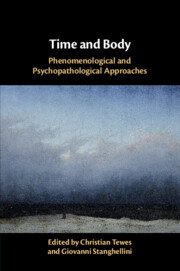Book contents
- Time and Body
- Endorsements for Time and Body
- Time and Body
- Copyright page
- Dedication
- Additional material
- Contents
- Figures
- Contributors
- 1 Introduction – Time and Body
- 2 Time, the Body, and the Other in Phenomenology and Psychopathology
- Part I Body and Time: General Aspects
- Part II Grief and Anxiety
- Part III Borderline Personality and Eating Disorders
- Part IV Depression, Schizophrenia, and Dementia
- 13 Intrinsic Temporality in Depression
- 13.1 Commentary on “Intrinsic Temporality in Depression: Classical Phenomenological Psychiatry, Affectivity, and Narrative”
- 14 Lost in the Socially Extended Mind
- 14.1 Commentary on “Lost in the Socially Extended Mind: Genuine Intersubjectivity and Disturbed Self-Other Demarcation in Schizophrenia”
- 15 Closing Up
- 15.1 Commentary on “Closing Up: The Phenomenology of Catatonia”
- 16 Embodied Selfhood and Personal Identity in Dementia
- 16.1 Commentary on “Embodied Selfhood and Personal Identity in Dementia”
- Index
- References
13.1 - Commentary on “Intrinsic Temporality in Depression: Classical Phenomenological Psychiatry, Affectivity, and Narrative”
Temporality and Affectivity in Depression and Schizophrenia
from Part IV - Depression, Schizophrenia, and Dementia
Published online by Cambridge University Press: 30 October 2020
- Time and Body
- Endorsements for Time and Body
- Time and Body
- Copyright page
- Dedication
- Additional material
- Contents
- Figures
- Contributors
- 1 Introduction – Time and Body
- 2 Time, the Body, and the Other in Phenomenology and Psychopathology
- Part I Body and Time: General Aspects
- Part II Grief and Anxiety
- Part III Borderline Personality and Eating Disorders
- Part IV Depression, Schizophrenia, and Dementia
- 13 Intrinsic Temporality in Depression
- 13.1 Commentary on “Intrinsic Temporality in Depression: Classical Phenomenological Psychiatry, Affectivity, and Narrative”
- 14 Lost in the Socially Extended Mind
- 14.1 Commentary on “Lost in the Socially Extended Mind: Genuine Intersubjectivity and Disturbed Self-Other Demarcation in Schizophrenia”
- 15 Closing Up
- 15.1 Commentary on “Closing Up: The Phenomenology of Catatonia”
- 16 Embodied Selfhood and Personal Identity in Dementia
- 16.1 Commentary on “Embodied Selfhood and Personal Identity in Dementia”
- Index
- References
Summary
Temporality is a foundational topic in phenomenological psychopathology, and it plays an especially important role in its analysis of depression and melancholia (e.g., Fuchs, 2001, 2013; Gallagher, 2012; Ratcliffe, 2015). An intuitive strategy is to explain abnormal experiences of time by appealing to a fundamental disruption of the temporal structure of consciousness, yet Lenzo and Gallagher (2021) highlight that this strategy is problematic.
- Type
- Chapter
- Information
- Time and BodyPhenomenological and Psychopathological Approaches, pp. 311 - 317Publisher: Cambridge University PressPrint publication year: 2020



